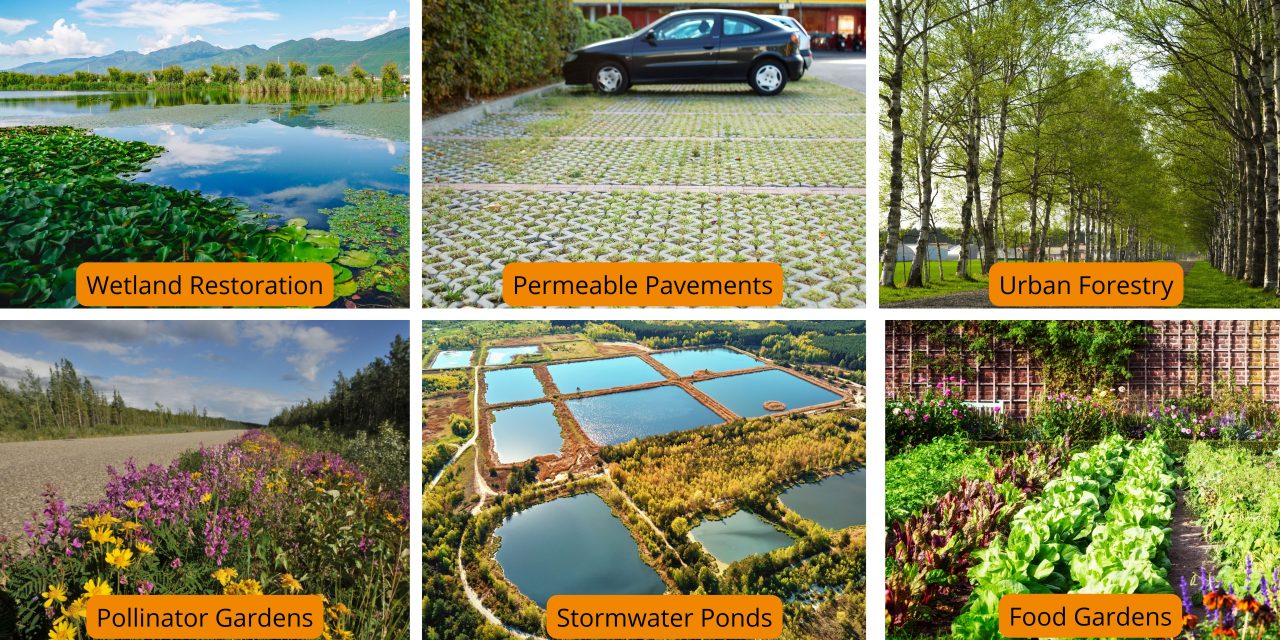Nature is a vital part of our communities. Our ever-growing population presents multiple challenges for our communities, including climate change, loss of biodiversity, waste management, disaster risk, food and water security, socio-economic development and human health. Local governments can adopt nature-based solutions to address challenges intensified by growing populations and our ever-growing climate change impacts.
Nature-based solutions (NBS) are multi-functional, economical and provide a variety of benefits for local government and communities, such as improved health and well-being, reduced pollution and revitalized urban spaces. By adopting NBS, such as building green roofs and permeable pavements, restoring natural ecosystems and green infrastructure, local governments can become more resilient to extreme weather events, increase food security by growing food gardens, increase community green spaces and improve the quality of life for residents.

NBS provides a variety of benefits for local governments and the community. Yet, a lot of work needs to be put into mainstreaming its implementation. More data and evidence of the effectiveness of NBS is needed to advocate for and seek resources and finances for wider implementation. Local governments can also play a key role in building collaboration among departments and stakeholders to ensure NBS is incorporated in community planning and policy development.
Here are some actions being undertaken by Canadian local governments to advance NBS in their jurisdictions:
Green roofs in the City of Toronto
In 2009, Toronto was the first city to have the most progressive green roof policies in the world. Green roofs are required on new commercial, institutional, industrial and residential development with a gross floor area of over 2,000 m². A 2021 estimate suggests that there are over 700 green roofs in the City of Toronto, contributing to limiting the urban heat island effect, improving air quality, stormwater management and providing recreational spaces for residents. In the most recent update to the Municipal Act, all Ontario municipalities now have alternative roof surfaces by-law authorities.
Natural Infrastructure projects in Coquitlam, BC
The City of Coquitlam, BC, has implemented several natural infrastructure projects including building a network of pipes on Burke Mountain to provide flood protection by diverting dangerous water flows away from smaller creeks. The City has also implemented bioswales to capture rainwater runoff from the parking lots, built roadside rain gardens and enhanced Nelson creek by planting vegetation and building biodiversity habitat.
Kerrison Wetland Restoration in Ajax
Undertaken by the Town of Ajax, this restoration project is expanding marsh and swamp wetland habitat, decommissioning old farm ponds and associated infrastructure, restoring and stabilizing existing stream bank erosion, and managing invasive species. Native trees and shrubs are being planted throughout the restoration area to improve biodiversity, increase natural cover and habitat for local wildlife, and enhance the green space for the community.

Local governments manage about 57% of Canada’s infrastructure, which includes our roads, bridges, shorelines, recreational spaces, as well as stormwater, wastewater, and drinking water facilities. Ambitious commitments and actions at the local level are critical to addressing the climate crisis and advancing the goals of global frameworks, including the UN Convention on Biological Diversity (CBD) and the UN Framework Convention on Climate Change (UNFCCC). Municipalities, regions, provinces and other stakeholders must be consulted with and involved in key decision-making at these meetings as they have a critical role to play in advancing Canadian climate commitments. Municipalities can lead locally by assessing challenges and identifying opportunities to apply NBS to mitigate these challenges. Adopting NBS can increase community resilience while improving the health and well-being of residents and securing ecological and economic benefits.
By Devanshi Kukadia, Research and Communications Manager.